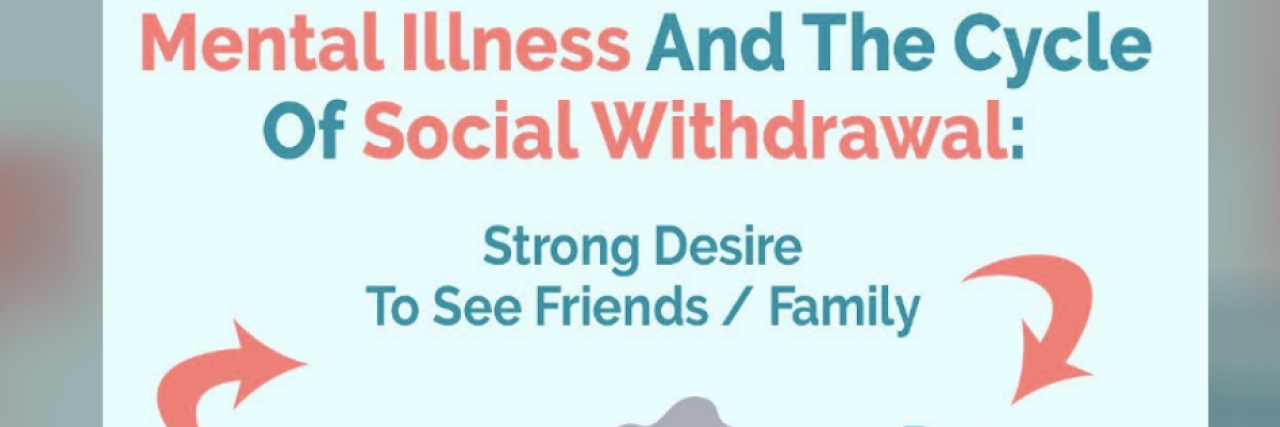If you or a loved one live with mental illness, you’re likely no stranger to the isolation that can often come along with it. The Depression Project, an organization founded by two brothers with hopes to support individuals with depression, posted a graphic on Instagram to explain the cycle of social withdrawal that many individuals who struggle with their mental health experience.
As someone with mental illness myself, I found the graphic incredibly relatable. The cycle begins with a “strong desire to see friends/family,” something we can all likely relate to. For some individuals with mental illness, however, that feeling of wanting social interaction can actually make us feel overwhelmed. The graphic gives examples of thoughts we might have such as, “I’ll have to fake a smile,” or, “What if I’m a burden?”
From there, the cycle moves into a decision to stay home, which then progresses into feelings of loneliness and isolation, circling back to that initial strong desire to see friends and family.
You see, as someone with mental illness, social interaction isn’t as simple as just going out and spending time with others. There’s often a strong sense of pressure to act like everything is OK, even when someone is really struggling. It takes a lot of energy to maintain that fake smile discussed in the graphic, and sometimes it all just feels like too much. Even when someone with mental illness does expend that energy to go out and socialize, it’s often an extremely draining experience. This doesn’t mean we don’t want to spend time with the people we love, but it often takes more energy to engage with others than we have to spare.
In my own life, this often looks like deciding to just go home after work when I really would love to see my friends. As much as I want to spend time with my friends, I’m already worn out from a long day at work and I don’t have the energy to do anything other than go home, even though going home then makes me feel more isolated, often worsening my depression. The reality is that even though being home at worse makes me feel more isolated and lonely, it still doesn’t take the energy that it would take me to spend time with friends and maintain a happy facade the entire time.
The good news is that if you have a loved one struggling with mental illness, there are some things you can do to help. Firstly, learn how this cycle works so you can conceptualize what your loved one is experiencing. Remember that it isn’t an indicator that they don’t want to spend time with you, but instead an indicator that they are struggling with their mental health right now. Reassure your friend or family member that it’s OK if they’re real with you, that they aren’t a burden and you won’t be upset with them if they’re having a bad day. Let them know that it’s OK if they don’t feel up to spending time together or if they need to cut it short, but continue to include them as much as possible. We may not feel up to social interaction, but knowing others want to include us is still usually better than not being invited out at all.
For individuals who resonate with this cycle personally, it’s important to understand it as well. Knowing what is happening within our own minds can often help prevent things from spiraling out of control, and I know I personally always feel better when I can identify that my mental illness is causing what I’m experiencing. If you want to, you can even show this graphic to loved ones to help them understand your experience. Remember that it’s OK to admit you’re struggling; true friends will want to support you as best they can.
Image via The Depression Project


